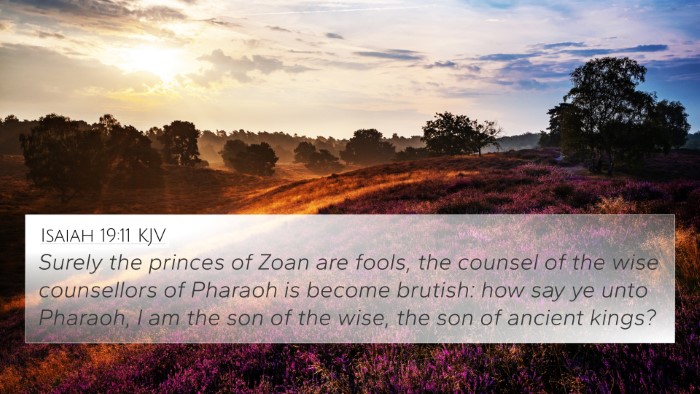Summary of Insights
This verse captures a pivotal moment during Israel's conquest of Ai, illustrating strategic military tactics and divine favor in the battle for Canaan. Through the lens of various public domain commentaries, we gather a rich understanding of its context and significance.
Historical Context
The Israelite campaign against Ai followed the Israelites' earlier defeat due to sin within their ranks (Joshua 7). After addressing these issues, God provided specific instructions that led to a successful strategy for this battle. The verse underscores the totality of God's control over the enemy and the importance of obedience to divine directives.
Commentary Insights
- Matthew Henry: Henry emphasizes the sovereignty of God in the affairs of war and peace, noting how the Israelites' success was tied directly to their faithfulness and purity of heart following their previous defeat.
- Albert Barnes: Barnes points out that the tactical move to leave Ai and pursue further illustrates the strategic battlefield maneuvers used by Israel. The abandonment of the city reflects both desperation and divine orchestration in their victory.
- Adam Clarke: Clarke elaborates on the significance of the cities mentioned (Ai and Bethel) in the biblical narrative. He indicates that their capture was not merely a physical conquest but also a spiritual triumph over the idolatry associated with these places.
Thematic Bible Verse Connections
The themes of obedience, strategy in warfare, and the demonstration of God's power are prevalent throughout the scriptures. This verse ties into various key biblical principles, illustrating God's covenant with Israel and the consequences of their actions.
Cross-References
To deepen your understanding and engage in comparative Bible verse analysis, consider the following related scriptures:
- Joshua 7:12: Discusses the Israelites' initial defeat and the importance of holiness.
- Deuteronomy 20:1: Offers instructions on how Israel should face their enemies.
- Joshua 8:1-2: God's command to take Ai and the assurance of victory.
- 1 Samuel 15:18: The importance of following God's command in military endeavors.
- Matthew 12:30: Highlights division in spiritual warfare.
- Romans 8:31: Affirms that with God on our side, we can conquer any adversary.
- Ephesians 6:12: Discusses the nature of our true battles as not being against flesh and blood.
Practical Application
As readers ponder the message of Joshua 8:17, it's crucial to reflect on our own lives regarding obedience to God's commands and trust in His strategic guidance in times of conflict. The verse serves as a reminder of the power of God to orchestrate outcomes that align with His will when His people choose to follow Him faithfully.
Tools for Bible Cross-Referencing
For those interested in exploring scripture further and seeking tools for effective Bible cross-referencing:
- Utilizing a Bible concordance to find words and phrases related to specific themes.
- Engaging with a cross-reference Bible study to discover related texts and themes.
- Investing time in Bible reference resources that facilitate deeper understanding.
- Employing a Bible cross-reference guide for systematic study and linking Bible scriptures.
Conclusion
In summary, Joshua 8:17 encapsulates themes of divine guidance, the nature of warfare, and the importance of obedience, linking it with many other relevant scriptures that underline God's continual presence in the lives of His people. Through cross-referencing and thematic connections, readers can gain a more enriched understanding of this passage and its implications for their faith journey.








